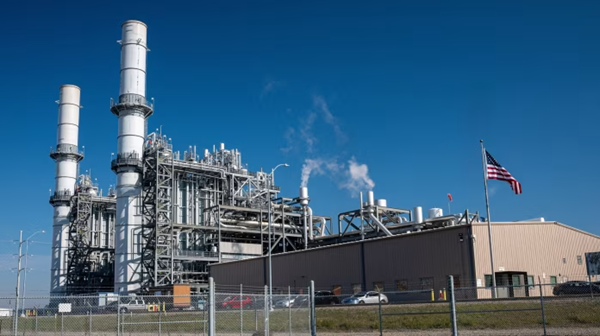|

Engine No. 1 says it is forming a joint venture with Chevron and
agreed to a partnership with energy company GE Vernova to
develop natural gas power plants © Bloomberg
|
Jamie Smyth
in
New
York JANUARY
28, 2025
Engine
No. 1,
the hedge
fund that
bested ExxonMobil in a
fight over
its approach
to climate change,
is teaming up
with the
supermajor’s rival Chevron
to build
fossil fuel
plants to
meet soaring artificial intelligence-driven power demand.
The
former activist
investor said
on Tuesday
it was
forming a
joint venture
with
Chevron
and agreed to a partnership with
energy company GE Vernova to develop natural gas power plants under a
fast-track timeline.
The venture comes four years after Engine
No. 1 launched one of Wall Street’s most audacious
proxy wars
against
Exxon,
arguing that
the oil
major faced
an “existential business risk” by pinning its future to fossil fuels.
At
the time
the hedge
fund claimed
Exxon had
not adequately considered that
oil and
gas demand could decline, saying the producer lacked a
“credible plan to protect value in an energy transition”.
Although it held only 0.2 per cent of
Exxon’s shares, Engine No. 1 won three seats on its board in a victory
that sent shockwaves across corporate America and became the
emblematic victory of the
environmental, social and governance movement.
Chris James, Engine No. 1’s founder and
chief investment officer, said the investment with Chevron was
consistent with its previous Exxon campaign.
“This is not a pivot. The Exxon campaign
was focused on governance and capital allocation as a way to create
value for shareholders. It was not about ideology or fossil fuels or
renewables,” James told the Financial Times.
“This partnership with Chevron and GE is
about allocating capital in an economy that is undergoing a
re-industrialisation and needs dramatically more power . . . This will
lead to value creation for shareholders.”
The companies plan to co-locate power
plants with data centres and deliver up to four gigawatts of
electricity — enough to power up to 3.5mn homes — by 2027.
The investment, which analysts estimate at
up to $8bn, is part of a race by energy companies to capitalise on
surging power demand forecasts linked to the rollout of AI data
centres.
“This is the beginning of these AI wars,”
James said, referring to the race between China and the US to harness
a technology its boosters believe will transform the global economy.
“We all know that China has an enormous
amount of power available. But if we are really going to do a digital
re-industrialisation of the US we’re going to need to make these
investments at scale,” James said.
 Engine
No. 1’s decision comes as Wall Street and large businesses across the
US
beat a steady
retreat from ESG and other progressive programmes that have drawn
fire from President Donald Trump and Republicans.
Engine
No. 1’s decision comes as Wall Street and large businesses across the
US
beat a steady
retreat from ESG and other progressive programmes that have drawn
fire from President Donald Trump and Republicans.
James, a hedge fund industry veteran who
made a fortune as a technology and biotech investor, has taken Engine
Number 1 in a different direction since the Exxon campaign. In 2023 he
announced the hedge fund would put $780mn into the base metals
business of Brazilian miner Vale and told the FT that he never
considered himself an activist investor.
“I consider myself an investor and
activism is a tool
of last resort, not a strategy,” he said.
The investors said they expected the gas
plants to be designed with the flexibility to integrate carbon capture
and storage — a technology that has yet to achieve full commercial and
technical feasibility.
The gas plant joint venture also marks a
strategic shift for Chevron, which is entering the electricity
business a few months after Exxon also declared plans to build gas
power plants to fuel AI data centres.
The announcement on Tuesday came a day
after tech stocks slumped on news that China had developed a cheaper
AI model that could need far less power than Silicon Valley’s energy-
intensive AI systems.
“We still see the growth in electricity
demand being significant, just in the rest of this decade, not to
mention past it,” said Jeff Gustavson, president of Chevron New
Energies.
“AI will be the big driver, but there are
other drivers: reshoring of US manufacturing and just overall
electrification in the pursuit of a lower carbon energy future.”
Exxon also declared plans to build gas
power plants to fuel AI data centres.
Copyright The Financial Times
Limited 2025. All rights reserved.